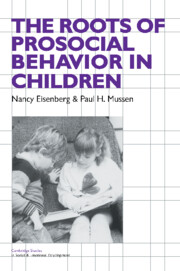Book contents
- Frontmatter
- Contents
- Preface
- 1 Introduction
- 2 Methodological and theoretical considerations in the study of prosocial behavior
- 3 Biology and prosocial behavior
- 4 Culture and prosocial behavior
- 5 “Person” variables and prosocial behavior
- 6 Socialization in the family
- 7 Socialization by agents outside the family
- 8 Cognition, role taking, interpersonal problem solving, and moral judgment
- 9 Emotional factors in prosocial behavior
- 10 Situational determinants
- 11 Conclusions
- References
- Name index
- Subject index
4 - Culture and prosocial behavior
Published online by Cambridge University Press: 31 December 2009
- Frontmatter
- Contents
- Preface
- 1 Introduction
- 2 Methodological and theoretical considerations in the study of prosocial behavior
- 3 Biology and prosocial behavior
- 4 Culture and prosocial behavior
- 5 “Person” variables and prosocial behavior
- 6 Socialization in the family
- 7 Socialization by agents outside the family
- 8 Cognition, role taking, interpersonal problem solving, and moral judgment
- 9 Emotional factors in prosocial behavior
- 10 Situational determinants
- 11 Conclusions
- References
- Name index
- Subject index
Summary
Anthropologists describe the norms of behavior (including cognitions, beliefs, ideals, and values) that are traditional, typical (or modal), and “expected” of people in particular cultures or subcultures. The array of cultural variation is enormous. As Margaret Mead concluded, “human nature is almost unbelievably malleable, responding accurately and contrastingly to contrasting cultural conditions” (Mead, 1935, p. 191).
In many cultures, prosocial conduct predominates, whereas in others, egoistic and selfish qualities are the norm. Recall the sharp contrast between the self-seeking, hostile Ik and the gentle, humane Hopi described earlier. Turnbull (1972) compared the Ik to members of other hunting societies who “frequently display those characteristics that we find so admirable in man, kindness, generosity, consideration, affection, honesty, hospitality, compassion, charity. For them, in their tiny closeknit society these are necessities for survival”. Turnbull hypothesized that the Ik lost these qualities when their established culture and traditions disintegrated completely because of a combination of disastrous historical, political, and technological events.
Societies and cultures can be maintained only if their members have at least some concern about each other, but the degree of social concern varies greatly from culture to culture. Cooperation and social responsibility are outstanding features of some cultures, but these qualities are not highly valued in others. Margaret Mead (1935) found two tribes on the same island, New Guinea, with strikingly different patterns of personality and behavior. Members of one, the Arapesh, were gentle, loving, cooperative, generous, unaggressive people who were highly responsive to the needs and feelings of others and unconcerned about personal property.
- Type
- Chapter
- Information
- The Roots of Prosocial Behavior in Children , pp. 42 - 54Publisher: Cambridge University PressPrint publication year: 1989

